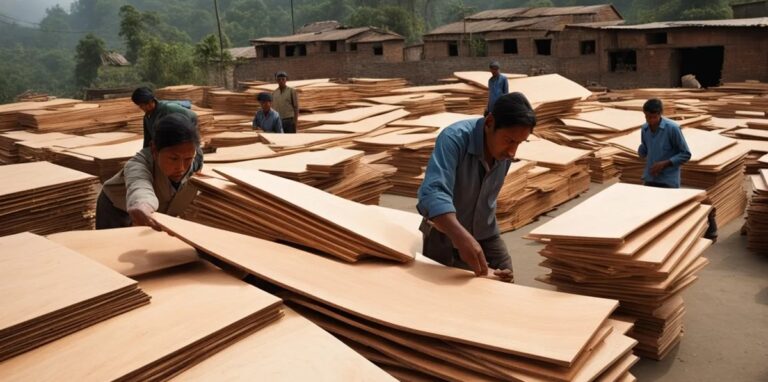Parbat: Gandaki Province has welcomed its second plywood manufacturing plant, established in Paradi, Kushma Municipality-8 of Parbat district.
The industry is an expansion of the Bindabasini Veneer Industry, operated for the past 16 years by local entrepreneur Shiva Sharma Adhikari, who has now upgraded it into a plywood-producing factory.
Plywood industries are rarely established in Nepal’s hilly regions, where low population density and logistical challenges make operations difficult. Adhikari, however, set up the factory to create local employment opportunities and reduce transportation costs for raw materials and finished goods.
Until now, veneer sheets prepared at the Paradi-based plant were transported to the Akala Ply Industry in Bahadurganj, Kapilvastu — also run by Adhikari — where they were converted into plywood. The finished products were then shipped back to Gandaki Province for sale. To cut transportation costs, Adhikari relocated the plywood production unit itself to Parbat.
Built with an investment of Rs 100 million (approximately US$ 750,000), the new plywood factory is expected to provide employment to around 300 people.
“Running the factory in my birthplace ensures jobs for local residents, while also creating a market for timber that would otherwise rot unused in rural areas,” Adhikari explained.
He added that the relocation aims to address rising unemployment and migration from the district, while also strengthening industrial development in the hilly regions. The existing veneer unit in Parbat already employs dozens of workers, and the expanded plywood operation will nearly triple that number.
Most plywood produced in Kapilvastu has so far been consumed within Gandaki Province. The new Parbat-based plant will continue serving the same markets, exporting to districts including Pokhara, Lamjung, Dang, Nepalgunj, Rukum, Rolpa, Salyan, and Butwal, in addition to the Dhaulagiri region.
Previously, raw materials from Parbat were sent to Kapilvastu for processing and then shipped back to Gandaki for sale — a costly cycle. Now, with production centred in Parbat, transport costs will be reduced, boosting company profits and lowering prices for consumers.
Gandaki Province’s first plywood factory was established in Damauli, Tanahun. With the new plant in Parbat, the province now has two active plywood industries.
Despite the milestone, Adhikari acknowledges that operating such industries in Nepal remains challenging, citing economic pressures and difficulties in securing financing from banks. He also raised concerns over the country’s forestry laws, which restrict access to raw timber.
“Nepal’s Forest Act is complicated, making it difficult even to purchase fallen trees,” he said. “Citizens struggle to sell timber from their own land, while industries face shortages despite large volumes of wood rotting in the forests. If these resources were mobilized, farmers could earn significant income.”
Although the Gandaki Province government has pledged to ease forestry regulations and treat timber like fresh agricultural produce, Adhikari said implementation has yet to become practical.



Comment Here